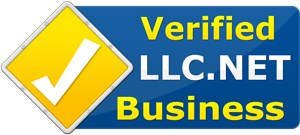
If you sign up now with LLC.NET you will also get the Verified Business Badge to include on your website free of charge. This is a $400 a year value. A verification badge on your website homepage will increase conversions and more importantly profits.



-
Why choose an LLC?
Off all of the benefits, taxation and liability are the two most important factors. Within this site you will find lots of information regarding the pros and cons of forming an LLC. Our goal here is to provide you with accurate information that doesn’t try to push into one direction over another. Some individuals and or their businesses needs will be better served with an LLC, some will not. It’s your job to do your homework to find out exactly where you should be.
-
Is An LLC Right For Me?
Luckily for you we didn’t like homework too much either. So the information contained within our site breaks things down in a very straight forward and easy to understand terms. One other benefit of working with LLC.net (should you choose to form an LLC) is that we provide you with the most financially efficient methods to file. Starting a successful business is tough work and its important that you have honest advice from a reputable source right from the start.
-
Why Should I Use LLC.net?
Not only with LLC.NET can you form an LLC, S Corporation, C Corporation, or Incorporate for some of the least expensive rates anywhere but you also get inclusion into the LLC.NET Verified Business Program. The main benefit to the LLC.NET verified business program is that you will be given a Verified Business Badge to include on the home page of your company website.
Five Tips for Sucessful Business Blogging
Blogging has changed from a simple past-time to a vital part of online marketing. In almost every corner of the business world, small companies and large corporations alike are using internet blogging to promote their products and services. Although blogging is something that even semi-illiterate high schoolers are taking part in, creating a successful blog which will gain your business a better reputation and more customers requires some special attention. Continue reading
Should You License or Sell Your Own Products?
One of the toughest questions faced by inventors is whether they should sell their products themselves or license them. While there is no easy answer to this question, the decision involves having adequate knowledge and the drive to see the project through to the end. Making an informed decision means understanding both options. Licensing is an agreement where the inventor allows someone to commercially market their products in exchange for royalties or a one-time payment. Continue reading
Truths About Website Marketing
If you look around you, you’re most likely to start noticing books, television reports, websites, and radio ads all boasting about the money that you can make by starting your own online business. For many people, it seems that starting an online business has become the “get-rich-quick” scheme that we’re all looking for. But how successful can online businesses truly be? Below, you’ll find six truths about starting a business online, giving you advice and useful information. Continue reading
The Popularity of LLCs
A Limited Liability Company or LLC is essentially a new type of business organization that has become immensely popular over the past ten years. There are a myriad of advantages associated with creating a LLC, the most significant of these being the fact that members have pass-through taxes, similar to those associated with a partnership, but are afforded limited liability.
By forming a limited liability company rather than creating a corporation, an individual can reap corporation type benefits while still avoiding most of the negative aspects that are associated with corporations. Those who choose to form a corporation are subjected to endless paperwork, double taxation and a vast array of other complicated issues. However, these undesirable aspects can be entirely avoided by those who opt instead, to form a LLC.



